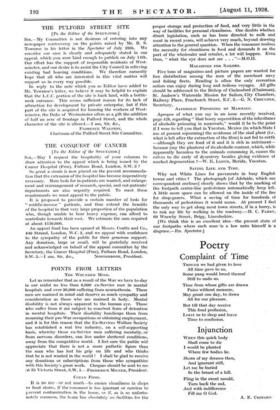POINTS FROM LETTERS
THE WOUNDED MIND.
Let us remember that as a result of the War we have to-day in our midst no less than 6,000 ex-Service men in mental hospitals and over 30,000 suffering front neurasthenia. These men are maimed in mind and deserve as much sympathy and consideration as those who are maimed in body. Mental disability is not always apparent to the human eye. Those who suffer from it are subject to constant fears of detention in mental hospitals. Their disability handicaps them from resuming their pre-War occupations or obtaining employment, and it is for this reason that the Ex-Services Welfare Society has established a real live industry, on a self-supporting basis, whereby those ex-Service men suffering mentally, or from nervous disorders, can live under sheltered conditions, away from the competitive world. I feel sure the public will appreciate that there is not a more pathetic figure than the man who has lost his grip on life and who thinks - that he is not wanted in the world ! I shall be glad to receive any donations or subscriptions from those who sympathize with this Society's great work. Cheques should be sent to me . fit 53 Victoria Street, S.W. 1.--FREDERICK MILNER, President.
CLEAN FOOD.
It is no use —or not much—to ensure cleanliness in shops or food stores, if the consumer is too ignorant or careless to prevent contamination in the home, or if, as is so unfortu- nately common, the home has absolutely no facilities for the proper storage and protection of food, and very little in the way of facilities for personal cleanliness. One doubts whether direct legislation, such as has been directed to milk and meat in recent years, will achieve very much, beyond drawing attention to the general question. When the consumer realizes the necessity for cleanliness in food and demands it on the part of the wholesaler and retailer, a lot will happen. Even then, " what the eye does not see . . "—M.O.H.
MAGAZINES FOR SAILORS.
Five tons of magazines and picture papers are wanted for free distribution among the men of the merchant navy and fishing fleets. Reading is often the only recreation sailors can enjoy during long and tedious voyages. All gifts should be addressed to the Bishop of Chelmsford (Chairman), St. Andrew's Waterside Mission for Sailors, City Chambers, Railway Place, Fenchurch Street, E.C. 3.—G. N. CROUCHER, Secretary. ALCOHOLIC POISONING OF MAMMALS.
Apropos of what you say in an issue recently received, page 428, regarding " that hoary superstition of the inheritance of alcoholic poisoning in mammals," would it be to the point if I were to tell you that in Yucatan, Mexico (in which State I am at present sojourning) the residuum of the sisal plant (i.e., what is left after the extraction of the fibre) is not fed to cattle —although they are fond of it and it is rich in nutriment— because (say the planters) of its alcoholic content, which, while apparently harmless to the animals consuming it, causes the calves to die early of dysentery besides giving evidence of marked degeneration ?—W. E. LLOYD, Merida, Yucatan.
SAVING LIFE AND TIME.
Why not White Lines for pavements in busy English towns and cities ? The photograph [of Adelaide, which our correspondent encloses] clearly shows that by the marking of the footpath centre-line pedestrians automatically keep left. A little more space can be allowed on the inside of the line for shop-gazers. What a saving of time for hundreds of thousands of pedestrians it would mean. At present I find the only way to get along most town streets, if in a hurry, is to risk my life by walking in the roadway.—H. C. PARRY, 69 Wrawby Street, Brigg, Lincolnshire.
[We think this is an excellent idea—the present state of our footpaths where each man 'is a law unto himself is a disgrace.—En. Spectator.]




























 Previous page
Previous page